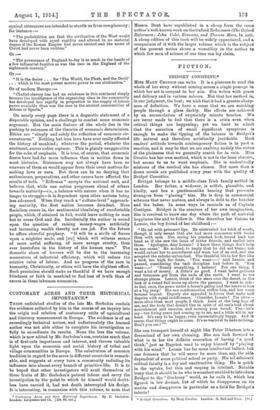CUSTOMARY ACRES AND THEIR HISTORICAL IMPORTANCE.*
THESE unfinished studies of the late Mr. Seebobm contain the evidence collected by him in the course of an inquiry into the origin and relation of customary units of agricultural and itinerary measurement in Europe. The evidence is of an exceedingly technical nature, and unfortunately the learned author was not able either to complete his investigation or fully to co-ordinate its results. None the less the volume, which is now edited by Mr. Seebohm's son, contains much that is of first-rate importance and interest, and throws valuable light upon the economic and social history of tribal and village communities in Europe. The substratum of common tradition in regard to the acres in different countries is remark- able, and suggests at every turn a community radiating its influence into almost every branch of primitive life. It is to be hoped that other investigators will avail themselves of these fruits of Mr. Seebohm's patient labour and carry the investigation to the point to which he himself would doubt- less have carried it, had not death interrupted his design. It is interesting, in connexion with this volume, to note that • Customary Acres and their Historical Importance. By F. Seebohm. London: Lougmans and Co. [12s. 6d. net.] Messrs. Dent have republished in a cheap form the same author's well-known work on the Oxford Reformers (The Oxford Reformers : John Colet, Erasmus, and Thomas More, Is. net). A cheap edition of this book will be widely appreciated, and a comparison of it with the larger volume which is the subject of the present notice shows a versatility in the author to which few men of science of our time can lay claim.


































 Previous page
Previous page